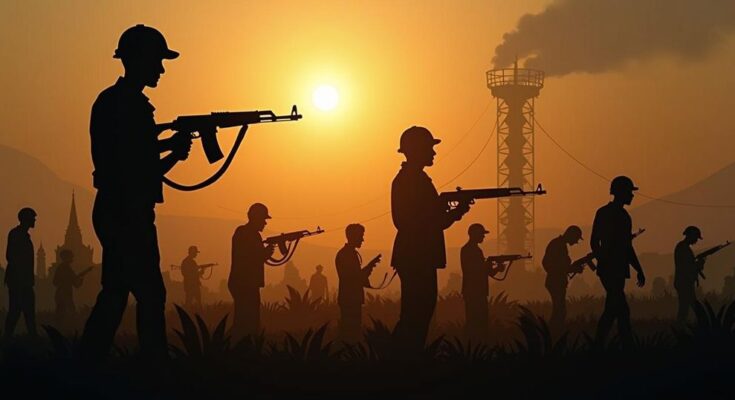Thailand has witnessed a dramatic increase in drug trafficking from Myanmar, linked to the ongoing civil war. Methamphetamine and heroin seizures have reached record levels as organized crime and local militias collaborate in drug production. Despite the increase in seizures, drug prices continue to drop, indicating a surplus in the market.
In recent months, Thailand has experienced a notable increase in the illegal drug trade originating from neighboring Myanmar, particularly due to the ongoing civil conflict. According to Apikit Ch.Rojprasert, the deputy secretary-general of the Office of the Narcotics Control Board (ONCB), there has been a significant uptick in the trafficking of drugs such as methamphetamines and heroin across the northern border. Apikit emphasized that the primary trafficking routes into Thailand remain through the mountainous regions and along the Mekong River, where organized crime networks have established partnerships with local militias and rebel groups in Myanmar. These groups have reportedly set up extensive drug production facilities, colloquially referred to as “super labs,” particularly within Myanmar’s Shan and Kachin States. Following the military’s takeover of Myanmar’s government in 2021, the nation descended into civil war, complicated by military offensives against various ethnic rebel factions. Apikit articulated that the complexities of this conflict have intensified the drug trade, stating, “Because of the armed conflict, the drug trade is one of the factors used to fund weapon purchases or drive the fighting forces.” He urged increased vigilance against crimes connected to drug trafficking and called for collaborative efforts with neighboring countries. Data from ONCB illustrates a staggering increase in drug seizures in Thailand’s northern provinces. In the first eight and a half months of 2023, methamphetamine tablet seizures surged by 172%, totaling 346 million pills, compared to the 2023 total. Crystal meth seizures rose by 39%, reaching 6.48 tons, while heroin seizures nearly doubled to 327 kilograms, marking a substantial increase since the previous year. Despite these significant seizures, the market for methamphetamine in Thailand is thriving, with prices for meth tablets plummeting to approximately 25-30 baht ($0.78-$0.93)—a stark contrast to prices recorded in previous years at 80 baht ($2.49) in 2017 and 200 baht ($6.21) in 2013. General Narit Thanwornwong, commander of Thailand’s drug suppression unit, echoed concerns that there may be upwards of 50 million meth tablets still en route to Thailand. His analysis suggested that while some armed groups are implicated in drug trafficking, other entities that are not part of the conflict also engage in production and trade. The ongoing political unrest in Myanmar has facilitated not only an escalation in the production of synthetic drugs but also a resurgence in opium cultivation, according to reports from the United Nations Office on Drugs and Crime.
The civil conflict in Myanmar has severely destabilized the region, leading to heightened illegal drug trafficking activities. Organized crime networks have taken advantage of the situation, forming alliances with local militias and exploiting the fallout from the political turmoil. This has resulted in an increase in the production and trafficking of various narcotics, particularly methamphetamines and heroin, into neighboring Thailand, where the demand is substantial. The Thai authorities have been alerted to the growing scale of the issue, indicating a need for enhanced border controls and international cooperation.
The ongoing civil war in Myanmar has had disastrous consequences for both the local population and neighboring countries, particularly in terms of drug trafficking. The considerable rise in drug seizures in Thailand underscores the scale of illegal narcotics trade, prompting authorities to respond with greater vigilance. As various organized crime elements exploit the chaos of the civil conflict, the need for cooperative strategies to combat drug trafficking has never been more critical.
Original Source: www.usnews.com




